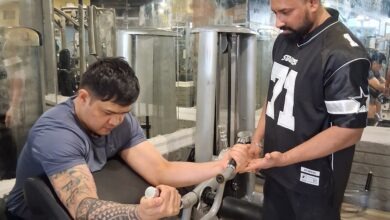Kuwait screens 500,000 expatriates annually for infectious diseases, safeguarding public health
The Expatriate Labor Screening Unit plays a vital role in protecting public health by conducting medical tests of workers by screening for infectious diseases, providing vaccinations and leveraging digital systems for efficiency.

-
Dr. Ghazi Al-Mutairi stated that Expatriate Labor Screening Unit is Kuwait’s first line of defense in protecting public health.
-
The unit uses advanced technology to enhance accuracy and efficiency in screening.
-
Health examinations include tests for Tuberculosis, Hepatitis B and C, HIV, Malaria, and Filariasis.
-
Future plans include AI integration, expanded centers, and enhanced Gulf cooperation to standardize examinations.
Dr. Ghazi Al-Mutairi, Head of the Expatriate Labor Screening Unit at the Public Health Department of the Ministry of Health, emphasized that the unit serves as Kuwait’s first line of defense in protecting public health. By conducting thorough medical examinations, the unit ensures the early detection of infectious diseases and assesses the health fitness of expatriates before they integrate into society, reinforcing the country’s commitment to maintaining a safe and healthy environment.
In an interview with Al-Anba, Dr. Al-Mutairi highlighted that over half a million expatriates undergo medical examinations each year. He emphasized the Ministry of Health’s commitment to continuously enhancing examination centers and expanding their capacity to accommodate the increasing number of workers entering the country.
Dr. Al-Mutairi announced the adoption of advanced technologies, including artificial intelligence and electronic health records, to streamline procedures and enhance diagnostic accuracy.
Furthermore, Dr. Al-Mutairi emphasized Kuwait’s commitment to upholding the highest international health standards by collaborating with government agencies and integrating medical examination results electronically with the Ministry of Interior. He also highlighted ongoing efforts to strengthen cooperation with Gulf countries to standardize expatriate medical screening procedures, ensuring a safer and healthier work environment for all.
Following are the key highlights from Dr. Al-Mutairi’s interview with Al Anba:
What role does the Labor Screening Unit play at the Ministry of Health?
The unit carries out comprehensive medical examinations to detect infectious diseases, including hepatitis B and C, AIDS, and Tuberculosis. In addition, it administers essential vaccinations such as the meningitis vaccine and ensures that accompanying children receive all required immunizations. To enhance monitoring and streamline residency procedures, test results are electronically recorded in the Ministry of Interior’s system, ensuring efficient health tracking for expatriates.
How many labor screening centers does Kuwait have and what are the future expansion plans?
The Ministry of Health manages five main labor screening centers across Kuwait’s governorates: Shuwaikh Main Center, Fahaheel Center, Rumaithiya Center, Jahra Center, and Subhan Center. These centers operate from Sunday to Thursday, between 7:30 a.m. and 6:00 p.m. To accommodate the growing number of expatriate workers and ease the burden on existing facilities, plans are underway to establish new centers in emerging areas, enhancing capacity and accessibility.
Promoting Public Health:
How does the Labor Screening Unit contribute to protecting public health and ensuring community safety?
The unit plays a vital role in safeguarding public health by enabling the early detection of infectious diseases, helping to curb the spread of epidemics. It also implements vaccination programs to reduce the risk of disease transmission and actively monitors and diagnoses Tuberculosis cases to prevent their spread within the community.

Medical Procedures:
What health standards does the unit adopt in evaluating expatriate workers?
The unit ensures rigorous medical screening by conducting accurate examinations for infectious diseases such as Hepatitis, AIDS, and Tuberculosis. Additionally, expatriate workers must receive necessary vaccinations based on the prevalence of diseases in their home countries. To further ensure accuracy, medical examinations are also mandated at accredited centers abroad before expatriates enter Kuwait, reinforcing the country’s health and safety measures.
What are the stages of medical examination for expatriate workers?
The examination process starts with the submission of necessary documents and registration in the electronic system. This is followed by laboratory tests, including blood sample analysis, to screen for infectious diseases. A chest X-ray is then conducted to detect Tuberculosis, and finally, the required vaccinations are administered based on the expatriate’s health condition.
Are there any new updates to the medical examination standards for expatriate workers?
Recent amendments have introduced mandatory Polymerase Chain Reaction (PCR) testing for Hepatitis C in expatriates, enhancing the accuracy of screenings. Additionally, new regulations have been established to standardize procedures for managing Hepatitis C cases among both residents and newly arrived workers, reinforcing public health safeguards.
How does the unit ensure that expatriate workers are aware of potential health risks?
The unit ensures they are aware of potential health risks through multilingual educational materials, pre-arrival screening guidelines, and on-site guidance during medical examinations. It also collaborates with employers to reinforce health awareness and utilizes electronic notifications.
What are the most prominent challenges currently facing the Labor Screening Unit?
The key challenges include the continuous need for advanced medical technology, the growing pressure on screening centers due to the rising number of expatriate workers, and the necessity to strengthen cooperation with local and international bodies to enhance examination quality and streamline procedures.
How many workers are examined annually in Kuwait?
Annually, between 500,000 and 600,000 expatriates undergo medical examinations, including domestic workers, private sector employees, and scholarship students. This comprehensive screening process underscores ongoing efforts to maintain a safe and healthy work environment.
What are the most prominent diseases detected during medical examinations?
The most commonly detected diseases among expatriates include Tuberculosis, Hepatitis B and C, and HIV (AIDS).
How are the expatriates diagnosed with infectious diseases handled?
A re-examination is conducted to confirm the diagnosis, and if the infection is verified, appropriate legal measures are taken. Cases that pose a public health risk are subject to removal, while treatable cases are referred to specialized medical centers for further care.
Technology and Development:
How does technology contribute to the development of labor medical examination processes?
The unit utilizes advanced electronic systems to record examination data and swiftly issue results. Efforts are also underway to fully digitalize the process, enhancing efficiency and minimizing errors.
What are the future development plans that the Labor Examination Unit is working on?
Future plans include establishing a unified database for medical examination results, expanding health infrastructure to accommodate more expatriates, and implementing an Electronic Health Record (EHR) system for more effective health case tracking.
Cooperation and Coordination:
What is the extent of the unit’s cooperation with other government agencies?
The unit maintains continuous coordination with the Ministry of Interior to keep labor data updated and integrated with the residency system. The electronic linking system enables the direct recording of health results, streamlining residency procedures and ensuring the deportation of medically unfit workers.
Are there partnerships with other countries to coordinate health standards for expatriates?
Yes, there is cooperation with Gulf Cooperation Council countries to standardize medical examination standards and share expatriate health data. Tests are conducted at accredited centers under the “Wafed” program, with results electronically sent to the Kuwaiti Ministry of Health and the Ministry of Foreign Affairs for visa approval.
Awareness and Public Health:
What are the efforts made by the unit in spreading health awareness among expatriate workers?
The unit conducts awareness campaigns by distributing multilingual brochures, organizing lectures on infectious disease prevention, and promoting public health initiatives. Awareness is reinforced during medical examinations, through educational materials, and via seminars focused on disease prevention and limiting infection transmission.
Future Expectations:
How has the COVID-19 pandemic affected the work of Labor Screening Unit?
The pandemic prompted a restructuring of procedures, with some services temporarily suspended and resources redirected to support virus containment efforts. It also highlighted the importance of digital transformation and the need for rapid testing systems to enhance preparedness for future health crises.
What preventive measures are implemented when receiving workers from infected areas?
Additional tests are required for workers arriving from high-risk countries to ensure they meet health standards and have received the necessary vaccinations before entering Kuwait.
How do you envision the future of medical examinations in light of digital developments?
The use of artificial intelligence, big data analysis, and remote testing systems will continue to expand, enhancing accuracy and accelerating medical screening procedures.
What impact does “Electronic Health Record” have on work efficiency system?
The system streamlines access to medical records, enhances reporting accuracy, and speeds up the completion of medical and administrative transactions.
How does the unit contribute to promoting public health in Kuwait?
This is achieved through early diagnosis of infectious diseases, administering vaccinations, and ensuring expatriate workers are healthy before they integrate into the society.
What plans does the unit have to keep pace with future developments in the medical field?
Efforts are ongoing to introduce modern testing technologies, expand medical screening scope, and implement AI-powered smart testing systems.
How are workers who violate health regulations dealt with?
Legal measures are implemented as per applicable laws, including re-examinations, deportation of medically unfit individuals, or referral for necessary treatment.
How are test results coordinated between the Ministry of Health and other entities?
Results are transmitted electronically through a unified system connecting the Ministry of Health with relevant authorities, ensuring accuracy and expediting the process.
What is Kuwait’s role in promoting public health across the Gulf?
Kuwait plays a key role in establishing unified Gulf standards for expatriate worker testing while also collaborating with neighboring countries to enhance preventive health protocols.
What is the future vision of the Labor Screening Unit?
The unit aims to enhance efficiency through digital transformation, expanding screening centers, and integrating smart systems to provide the best health services for expatriates and the community.
The First Line of Defense:
Dr. Ghazi Al-Mutairi, Head of the Expatriate Labor Screening Unit at the Public Health Department of the Ministry of Health, highlighted the unit’s pivotal role in safeguarding public health in Kuwait.
Importantly, as the first line of defense, the unit works to detect and prevent the spread of infectious and non-communicable diseases that could pose a risk to society.
An Integrated Digital Future:
Dr. Ghazi Al-Mutairi announced the Ministry of Health’s plan to enhance efficiency through advanced analysis systems and unified databases, ensuring faster and more accurate medical examinations. These improvements will significantly elevate the quality of health services in Kuwait.
Moreover, Dr. Al-Mutairi also expressed his gratitude to the Minister of Health, Dr. Ahmed Al-Awadhi, Undersecretary of the Ministry, Dr. Abdulrahman Al-Mutairi, Undersecretary of Public Health, Dr. Munther Al-Hasawi, and Director of the Public Health Department, Dr. Fahd Al-Ghamlas, for their continuous support in overcoming challenges and optimizing services at examination centers.
International Standards:
Dr. Ghazi Al-Mutairi stated that the labor examination centers under the unit operate in accordance with the highest international health standards. Expatriate workers undergo comprehensive medical screenings, including tests for infectious diseases such as Tuberculosis, Hepatitis B and C, and HIV, as well as parasitic diseases like Malaria and Filariasis.












